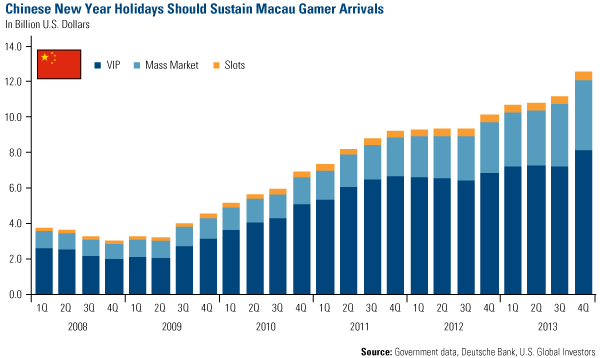Emerging Markets Radar (February 3, 2014)
Strengths
- Hungary's trade balance surplus for the month of November was its second best since the spring of 2011. The $825 million surplus was mainly supported by increasing exports to the European Union (EU) common market. In addition, the Eastern European nation posted a sizeable decrease in unemployment, which fell to 9.1 percent from 9.3 percent previously.
- South Africa surprised the markets this week as it announced that its fiscal budget for the month of December reached a $30 billion surplus. Reaching the highest that it has been in at least ten years, this surplus is owed to both increased collections and lower expenditures. In addition, the African nation also posted its largest trade-balance surplus since December 2012, providing support for its weakening currency.
- South Korea’s industrial production bounced back 2.6 percent year-over-year in December, ahead of market expectations, from a 0.8 percent contraction in November. This is thanks to sequential output gains from semiconductors and automobiles.
Weaknesses
- Eastern European currencies depreciated significantly for the week ended January 31. The Hungarian forint lost 3.46 percent relative to the dollar, while the Polish zloty and the Russian ruble weakened 2.55 percent and 1.81 percent, respectively. Central bank inaction was notable in the region in the midst of a volatile environment for emerging market currencies.
- Russia’s economy grew less than half of its 2013 pace, as the reported GDP advance of 1.3 percent, the least since a 2009 recession, fell short of economists’ forecasts. Similarly, India’s full-year GDP growth was revised down to 4.5 percent from earlier estimates of a 5 percent rise. The most recent year’s growth was also a disappointment following India’s 2012 GDP growth above 6 percent.
- GDP growth in the Philippines decelerated to 6.5 percent year-over-year in the fourth quarter from 6.9 percent in the third quarter, the slowest pace since the second quarter of 2012. Private consumption and fixed-asset investment growth declined due to strong typhoon and fiscal restraint led by investigations on misuse of budgetary resources.
Opportunities
- China’s decision to bail out investors in a $500 million trust loan product, many of which are high net worth individuals, should alleviate market fears of a potential liquidity crunch in Macau casinos’ VIP business. This comes just in time to sustain gamer arrivals amid Chinese New Year holidays. The Macau gaming industry’s evolution from VIP to mass market, high free cash flow generation, and undemanding valuations given solid earnings prospects in the next few years, are among the key drivers for continued outperformance going forward.
- For the second time this year, Bank of America raised the 2014 GDP forecast for the eurozone. According to the bank, the area will now grow 1 percent in 2014 and 1.5 percent in 2015. The increased confidence in the eurozone recovery is set to benefit the export industries of major Eastern European countries.
- Turkey’s conglomerates have positioned themselves as the safest investments in the country as the taper storm hammers the Eastern European nation. Given the joint ventures they have established with global firms, the risks posed by a depreciating currency and higher interest rates are manageable, especially since most of their businesses make sales abroad or have the ability to adjust prices quickly. Business segments such as oil refining and car exports can gain slightly from a weaker lira.
Threats
- The Federal Reserve announced a second $10 billion decrease in its monthly bond purchases, strengthening the U.S. dollar and weakening most emerging market currencies. Weaker emerging market currencies could strengthen export-focused industries, but they do carry severe inflationary implications for nations with current account deficits and trade imbalances.
- Emerging market funds saw outflows of $6.3 billion in the week ended January 29, marking the fourteenth-straight week of outflows. The outflow rate is the highest in more than two years, with global emerging market, Latin American, and Asian funds seeing the largest redemptions. Turkish-dedicated funds had modest net inflows despite the ongoing stress.
- Volatility could persist in the short term in Thailand, as the risk of a violent confrontation is growing between rival political groups. An anti-government protest leader called for a nationwide mass rally on election day, February 2, to prevent former premier Thaksin Shinawatra from returning to power.















